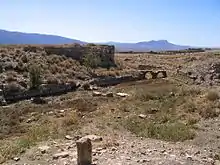36°00′58″N 9°31′49″E / 36.01617°N 9.530301°E

Henchir Bez is an archaeological site in Tunisia,[1] located at 36° 00′ 23″ N, 9° 32 in the hills overlooking the Oued Miliane river,[2][3] west of Tunis.[4][5][6] Identified by a recently discovered inscription,[7][8] it is the ruins of the Roman civitas of Vazi Sarra,[9][10][11][12] which include a Christian Basilica and a Byzantine/Roman fort.[13]
Ruins
The ruins at Henchir Bez have been identified as the remains of Vazitana Sarra Civitas (Vazi Sarara),[14] a civitas of the Roman province of Africa Proconsularis.[15][16] The remains at Henchir Bez include a Bascilica and a fort. The fort was originally a temple dedicated to Mercury Soberus.[17][18]
Etymology
The name Henchir Bez means the "ruins of Bez" where 'bez' probably derives from the ancient "Vaz[i]" through Linguisitic Fortition. The name Vazitana Sarra Civitas is supported by recent epigraphical finds[19]
Bishopric
The ancient Roman town of Vazi-Sarra was also the seat of an ancient Catholic Bishopric. It existed until the Muslim conquest of the Maghreb, and is now a titular see of the Roman Catholic Church.
Another ancient Bishopric, Marcelliana, was located nearby. However, its exact location is unknown.[20]
References
- ↑ Sarara, Naidé Ferchiou,Henchir Bez, l'antique Vazi Antiquités africaines (2002)Vol38,Num1, pp. 415-421.
- ↑ Vazi Sarra, Henchir-Bez.
- ↑ R.B. Hitchner ,R. Warner, R. Talbert, T. Elliott, sgilles, Vazi Sarra at pleiades .
- ↑ N. Ferchiou, Henchir Bez, l’antique Vazi Sarara, AntAfr. 38-39, 2002–2003, 415–421
- ↑ R. Cagnat - A. Merlin, Atlas archéologique de la Tunisie : édition spéciale des cartes topographiques publiées par le Ministère de la Guerre, accompagnée d'un texte explicatif (Paris 1914) Cat. no. 30.107
- ↑ A. Hanene, A propos de C. I. L., VIII, 23750 provenant de Henchir Bez/Vazi Sarra, CahTun 197/198, 2006, 69;
- ↑ Naidé Ferchiou , Henchir Bez, l'antique Vazi Sarara Antiquités africaines (2002) Volume 38 Numbér 1 pp. 415-421.
- ↑ Barrington Atlas: BAtlas 33 E1
- ↑ Naïdé Ferchiou, Henchir-Bez.
- ↑ Anna Leone, Changing Townscapes in North Africa from Late Antiquity to the Arab Conquest(Edipuglia srl, 2007 )p33.
- ↑ [layout=topographie_item&search[constraints][topographie][searchSeriennummer]=8007282 Vazi Sarara (Vazi Sarra).
- ↑ more formally Vazitana Sarra Civitas.
- ↑ Anna Leone, Changing Townscapes in North Africa from Late Antiquity to the Arab Conquest (Edipuglia srl, 2007)p271.
- ↑ Barrington Atlas, 2000, pl. 33 E1
- ↑ "Vazi Sarra: A Pleiades place resource". 20 October 2012.
- ↑ Ferchiou N., 2002-2003b, Henchir Bez, l'antique Vazi Sarara, Antiquités. Africaines 38-39, 415-421.
- ↑ Anna Leone, The End of the Pagan City: Religion, Economy, and Urbanism in Late Antique North Africa(OUP Oxford, 2013) p64.
- ↑ D. S. Robertson, Greek and Roman Architecture(Cambridge University Press, 1929 )p345&356.
- ↑ Naidé Ferchiou , Henchir Bez, the ancient Vazi Sarara. ( 2002)
- ↑ Titular Episcopal See of Marcelliana.